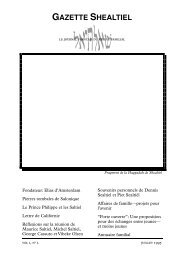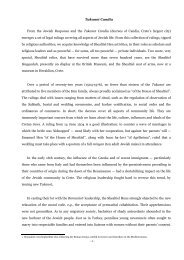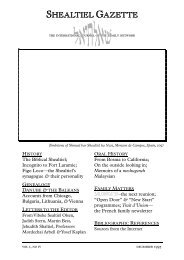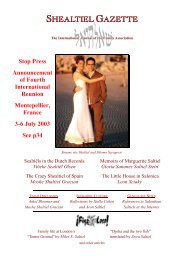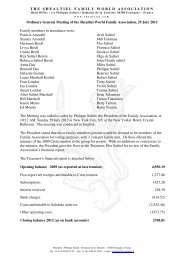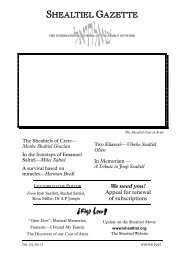The Cotopaxi ColonyThe sequence of eventsIn the adjacent passages, <strong>Satt</strong>, providesno dates, but presents the followingsequence.1. Store credit stopped.2. Early frost; potato crop fails.3. Settlers resort to working in Saltiel’smine for scrip.4. Settlers then work for the Denver andRio Grande Railroad, “instead of withSaltiel”.By contrast the evidence of Schwarz’report makes for the following sequence.1. Settlers work in a mine, presumablySaltiel’s, and on the railroad.2. Report dated 23 October 1882.3. Potato crop fails.In addition, from its positive content andtone, Schwarz’ report must antedate thecrisis following the stop in credit.See Appendix 1—A note on sources,f0r a full treatment of this topic.The cost of keepThe colonists’ earnings from the Denverand Rio Grande enable us to makeanother estimate of the cost of keepingthe colonists. We understand from <strong>Satt</strong>(p29) that 23 of the colonists were menfit for work; Schwarz confirms this (p5). Iassume that 21 of these (<strong>Satt</strong> says “nearlyevery man”) worked for the railroad andthey earned an average rate of $2.50 perday. <strong>Satt</strong> writes “as much as $3.00”;Schwarz writes $2.00(p13). Afteradjusting for the Sabbath, the railwayworkers were contributing $45 per day tothe colony. If we take off ten percent fortravel to and from the railroad we get justover $40 per day to support the colony.We may use this sum to estimate thecredit taken <strong>by</strong> the colonists from arrivalon 8 th May 1882 to the “Autumn”—let ussay 1 st October 1882, some 146 days. If weadjust for the smaller number ofcolonists between 8 May and mid June,we obtain a figure of just under $5,900.These figures are consistent with thosebased on Ed Grimes’ earnings and in themiddle of the range between $1,545 and$8,000 set out in Appendix 1.Three prominent men from DenverThe colonists bought kosher meat fromDenver after the beginning of August, sowere in continuous contact thereafter(Schwarz p13). The three men includedan attorney, George H Kohn (Roberts opcit p129). From this point the pioneershad access to legal counsel, which in thenature of things would have extendeditself to negotiating and campaigningtactics. Thus, the immediatelysubsequent arrival of the press and thecolonists’ “smoke and mirrors” campaignagainst Saltiel (p28 and sidebar). Thesewere the raw material for the exchangesleading to the final settlement betweenthe pioneers and HEAS and Saltiel (p28and sidebar). It is no mean testament tothe skills of Mr Kohn that <strong>Satt</strong> or hersources took this sequence at face value.Mining in deep underground shafts and tunnels is never pleasantwork but in wintertime it is particularly disagreeable and hazardous.Since the labor shortage extended to other fields as well, theJews found they could have employment with the railroad insteadof with Saltiel. The Denver and Rio Grande Railroad was thenbuilding its line west of Salida to connect the booming miningcamps along the Continental Divide and Western Slope. the railroadwas only too happy to employ the Jews as track laborers andeven permitted them to take Saturday as their day off, instead ofSunday. Nearly every man in the colony worked that winter for theDenver and Rio Grande, and received cash wages of as much as$3.00 per day, with which they managed to support the entiregroup of sixty-three persons.The colony had another reason to be grateful to the Denver andRio Grande Railroad that winter. The women had been accustomedto scour and comb the tracks in the area for bits of coal orwood dropped <strong>by</strong> passing trains. Sympathetic engineers and firemen,noticing them, learned of their plight and then would regularlytoss down as much coal and wood as they could, thus enablingthe women to obtain enough fuel to keep them alive thatwinter.Word of the colony’s predicament reached Denver and they werevisited <strong>by</strong> several interested groups. First, the Jewish communityof Denver sent as much help as they could, including warm winterclothing, food, medicine and other necessities. Three prominentmen from Denver came down to investigate at first hand. On theirreturn they framed still another appeal to the Hebrew EmigrantAid Society, explaining Saltiel’s actions and describing his reputation.Then, a number of reporters from the Denver newspapers appearedand interviewed the immigrants and the townspeople.They had heard of this unusual agricultural experiment in Denverand had come down to check certain reports of mismanagementand illegalities.26
<strong>Flora</strong> <strong>Jane</strong> <strong>Satt</strong>—annotated <strong>by</strong> Miles SaltielThe Denver Republican played up the story, emphasizing Saltiel’sresponsibility and the HEAS’s gullibility in investing such a largesum in so novel an experiment, without proper investigation before-hand.They exposed Saltiel’s entire plan as a “vile atrocity”and described the colonists’ sufferings in minute detail. This newspapertook the opportunity of divulging at the same time, other ofSaltiel’s deals and schemes, as well as his unsavory personal reputation.“Unsavory personal reputation”This echoes Roberts (op cit p129), whogoes on at this point to repeat allegationsthat Saltiel had “failed to provide for hisfamily”. This should be seen in light ofthe 1881 collapse of Saltiel’s marriage;see the sidebar, Biography ofEmanuel Saltiel on page 5. This gaverise to the customary exchange ofallegations—hers of his failure to providesupport; his of her notoriousinfidelities—and may also havecontributed to his absence fromCotopaxi.The Rocky Mountain News tended to play down the whole story,reminding its readers that all pioneers must endure some hardshipand compared conditions in other outlying districts withthose at Cotopaxi, making the lot of the Jews there seem ideal,even better than most.The colony did manage to survive the first winter, but they facedthe coming spring with determination not to make the same mistakesnor rely on Saltiel for any further assistance. They observedtheir first Passover at Cotopaxi that April of 1883, and immediatelyafter the rites were concluded, again borrowed seed andequipment and sowed their second crop. But nature seemed toconspire against them, for scarcely were the seeds in the groundwhen a late spring blizzard ruined a large part of them. These latestorms are common in Colorado but to the struggling and discouragedcolonists, it seemed a special punishment directed at themalone.HEAS ‘report on the colonistsThe view of the Rocky Mountain News isechoed <strong>by</strong> the report of March 2, 1883 fromH S Henry of HEAS:.“… a committee sent <strong>by</strong> German, Irishor Norwegian Emigrant Society wouldprobably have encouraged the colonists<strong>by</strong> pointing out that their presentdiscomforts were temporary, that withthe return of spring and anotherharvest, things would improve; thatperseverance after all the expenditureof money would certainly result inultimate success.... This committeewould recommend that to start life in anew country is not child’s play--thatthere are frequent disappointments andsome misery…”Cited in Hard Times: The Jewish colony atCotopaxi, Article <strong>by</strong> Nancy Oswald,Colorado Central Magazine, No. 132,February 2005, Page 26; and available athttp://www.cozine.com/archive/cc2005/01320261.html.Again they wrote to the Hebrew Emigrant Aid Society for advice.Up to this time, the directors of that agency in New York could dolittle but counsel patience and fortitude, but <strong>by</strong> the late summer of1883, the pressure of immigration had subsided in New York, dueto the Czar’s temporary retirement of Ignatieff, and the new directorfound time to write to the unhappy farmers in Colorado. MichaelHeilprin had been forced to retire that same summer, due toillness, and his successor was not as familiar with the whole story.27



